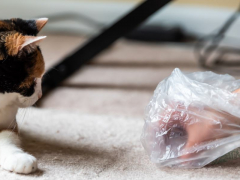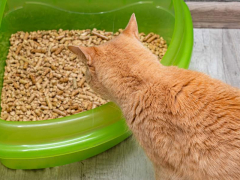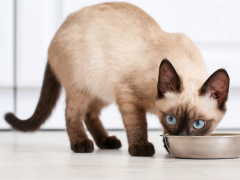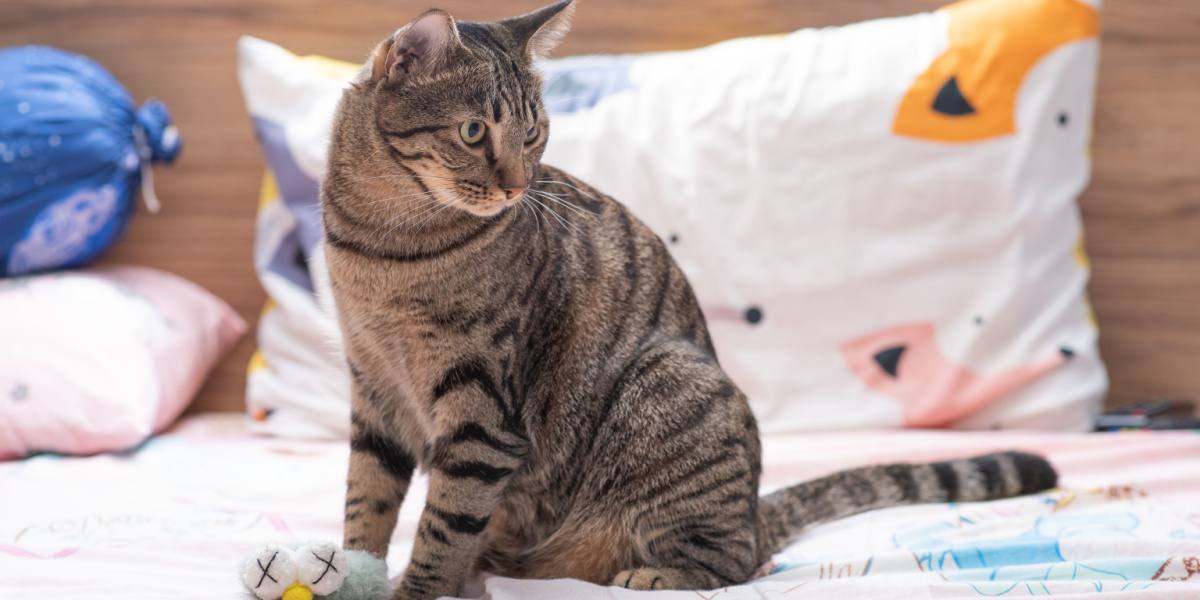
Finding a pile of cat poop on your bed when you’re ready to hit the hay at the end of a long day is a bit of a nasty shock! Most cat owners love to share their beds with their feline family members, but we don’t love it when they use it as a toilet. You’re probably reading this article because this is a situation you’re familiar with, and you’re worried about why your cat has done this.
There can be a huge range of reasons why your cat is soiling on your bed, and you’ll want to get to the bottom of this behavior. So, let’s explore some of these problems to help you identify the cause of your cats’ stinky behavior.
Reasons Why Cats Poop on the Bed
Cats can be introduced to the litter box at 3 weeks old, so they learn where to poop pretty quickly. Our feline family members are also extremely clean and known to be the easiest domestic pet to potty train. Cats also often prefer to poop outside if they have access to a garden.
So when your cat is pooping outside the litter box, it’s usually a sign that something isn’t right, and there are lots of possible reasons for this.
1. They Don’t Like Their Litter Box
All cat owners will know how fussy our feline family members can be when it comes to the litter box. They are very particular. A common reason your cat refuses to use the litter box is that they simply don’t like the texture or style of the cat litter in there.
The style of your cat’s litter box may not suit their preferences either. Cats are very private, and many prefer a lid and door so they can do their business in peace. The location of the litter box in your home can be a problem too. If it’s in a noisy spot, or difficult to access they might be less likely to use it.
A dirty litter box is another common reason your cat might defecate elsewhere. A dirty protest can be your cats’ way of letting you know that their litter box needs cleaning out. You should clean out the poop as soon as you know there’s one in there and change the litter daily. Cats don’t like to toilet in places they have already used several times.
2. Not Enough Litter Boxes
If you share your home with more than one cat, you’ll need to have enough litter boxes for everyone. Cats are very territorial and private when it comes to their toileting habits, so they often don’t like to share litter boxes, or might even refuse to share them. As a rule, you should have one litter tray per cat plus one. That might sound like a lot, but your cats will thank you!
3. Illness
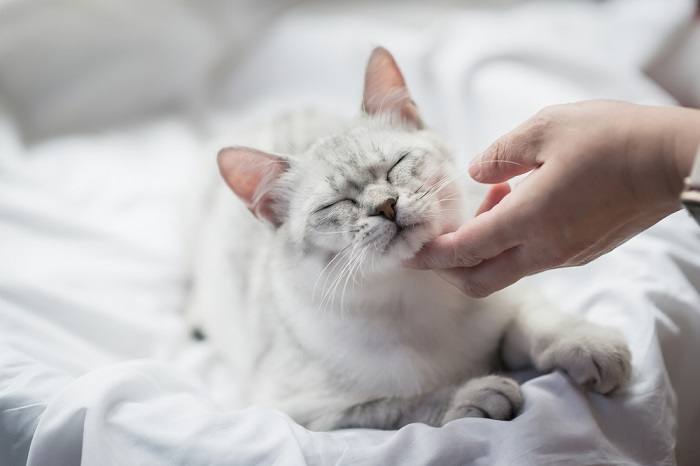
Suddenly pooping outside the litter box is often the first sign of a medical issue.
Pooping on the bed can also be a sign that your cat has a medical issue. They might not be able to reach the litter box or the garden fast enough, or need to go more often than usual for some reason. Gastrointestinal problems are usually the cause of this behavior if it’s down to poor health, but a few other health issues can also cause changes to your cat’s toileting habits.
- Intestinal parasites
- Irritable bowel syndrome (IBS)
- Food allergies/sensitivities
- Infections (bacterial or viral)
- Toxin ingestion
- Hyperthyroidism
- Cancer
If you notice diarrhea, worms in the feces, blood in the feces, straining to pass feces, constipation, or any other changes to your cat’s toileting habits, get them checked over by your usual veterinarian. Your vet will examine your cat and may run some tests to find out the cause and start the most appropriate treatment.
4. Stress
Stress can cause changes to your cat’s toileting habits, especially when it comes to where they poop and pee. They are highly sensitive animals and don’t like changes to their routine or environment. Some common stressors that can cause your cat to poop outside the box might be:
- New surroundings such as a new home
- A new cat or dog in the house
- Visitors
- Problems with neighboring cats
- People moving in or out of the house
- Tensions with other cats in the house
- Loud noises
- Separation anxiety
5. Changes in the Environment
Cats like routine and consistency, so any change in their environment can cause stress that leads to changes in their toileting habits. Cats might poop on the bed because they are frightened or not sure where else to go in these situations. Common changes that can cause your cat to poop on the bed might be:
- Change in litter box location
- Different litter
- A new kitten/cat or a new dog
- People moving in or
- Building work
- New surroundings such as a new home
Also Read: How To Introduce A New Kitten To An Older Cat
What To Do if Your Cat Is Pooping on the Bed
Finding cat poop on your bed a nasty surprise, but it’s also really worrying for cat owners. And it’s a habit you’ll want to get to the bottom of and solve as quickly as possible.
1. Find Out the Cause
Look out for other signs of illness such as vomiting, changes to your cat’s appetite or activity levels, or changes to their behavior. If your cat is showing signs of being unwell, get them checked by the vet. The vet might need to perform some tests such as blood tests, poop samples, or imaging to find out what’s going on.
You should also look for other behavioral changes that might point toward a problem with stress or anxiety. Your vet can also help and advise you on other aspects of cat behavior.
2. Eliminate Possible Triggers/Stressors
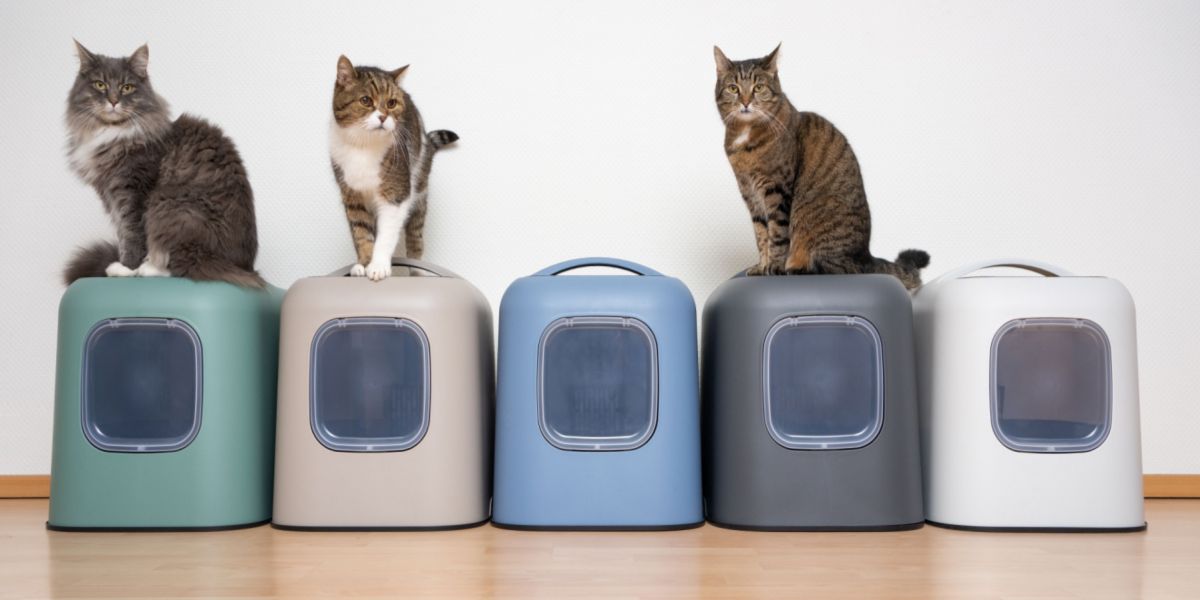
Take a close look at your household setup and routine to eliminate anything that could be stressing your cat.
If you think you know what is causing your cat to poop outside their litter box, you can make a few changes at home to help them feel more relaxed.
Keep their routine and environment as consistent as possible when it comes to feeding, make sure there are enough litter boxes for all the cats in the house, keep up to date with worming treatments, and make sure your cat has plenty of safe quiet spaces in the house to hide and rest.
3. Litter Box Maintenance
Keeping the litter box clean and fresh for your cat will make it more enticing for them to use. If you know what type of litter your cat prefers, try to always use that one. Clean out any poop as soon as you know they’re in there and change the litter at least once a day. Keep the litter box in the same place, and make sure it’s somewhere quiet and private.
4. Create a Calm Environment at Home
We can’t completely avoid all stresses such as visitors or occasional loud noises but keeping the environment at home as calm and relaxing as possible will help reduce your cat’s stress.
You can use pheromone sprays and plug-in diffusers such as Feliway to help relax your cat, especially in your bedroom and where they sleep. You can also use calming supplements. Make sure your cat has a safe and quiet space to hide and rest and try to keep their routine as consistent as possible.
5. Never Punish Your Cat
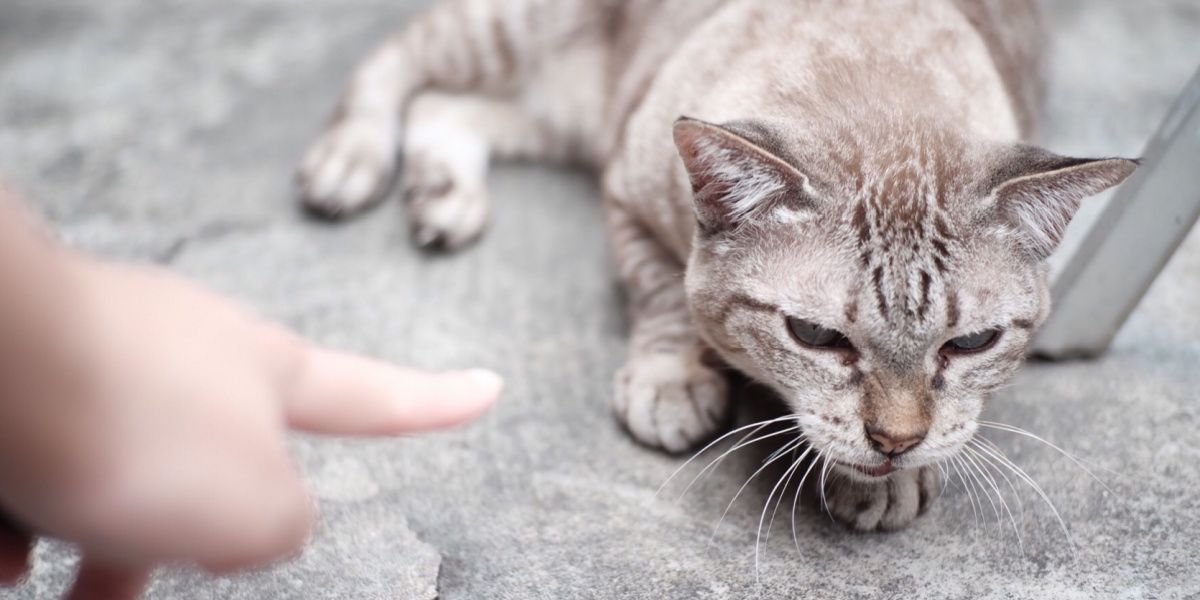
Punishment will not resolve the behavior and could even make it worse.
It’s very important that you don’t punish your cat for pooping on the bed. Raised voices and stern words can stress your cat out even more and make them more likely to repeat the behavior.
Also Read: 8 Reasons You Should Never Punish Your Cat
Final Thoughts
It can be really worrying and even infuriating if your cat poops on your bed. Many cat owners have experienced this nasty surprise at some point! The most common reasons for this behavior are related to stress, illness, and the litter box. You must never punish your cat for their behavior, but you will need to get to the bottom of the problem.
Litter box maintenance, maintaining a stress-free environment, and keeping your cat’s routine consistent will help. It’s also important to get your cat checked over by the vet to make sure that there aren’t any health problems causing this behavior.
